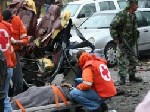 almotamar.net Google
almotamar.net Google - Bomb blasts hit a pair of commuter buses in a co-ordinated attack that killed three people near Beirut today, on the eve of a massive rally marking the 2005 assassination of Lebanon´┐Żs former prime minister.
The blasts stoked fears of more turmoil, as an already tense Lebanese capital braced for Rafik Hariri´┐Żs commemoration. Government supporters plan to mark the day with a massive rally at the late premier´┐Żs grave site in downtown Beirut - just feet away from ongoing opposition protests seeking to topple the government.
The explosions today ripped through two commuter buses travelling on a busy mountain highway north east of Beirut, killing three and injuring 20, police said.
Witnesses at Ein Alaq said a bomb exploded in one bus around 9 am local time. As rescuers rushed to the scene, a second explosion, about 10 minutes later, tore through a second bus that had driven down behind it.
The buses were driving people to work and operate every 10 minutes, ferrying people from Christian mountain villages to the coastline and Beirut.
Pro-government groups said the attacks aimed to scare people away from Wednesday´┐Żs commemoration rally. They said they were determined not to cancel the gathering.
Lebanon has been hit by a series of bomb attacks in the past two years - including the suicide truck bombing that killed Hariri and 22 other people on February 14, 2005.
Other blasts have killed or maimed other anti-Syrian politicians, and a few have hit public areas, usually causing few casualties.
Those responsible for the bombings have not been found, but government supporters accuse Syria of being behind the attacks, a charge Damascus denies.
The blasts have fuelled tensions amid Lebanon´┐Żs escalating political power struggle between the Western-backed government and the opposition, led by the Syrian- and Iranian-backed Hezbollah.
Opposition leaders called the explosions an impetus for politicians to work together to end the crisis that has shaken Lebanon for months.
President Emile Lahoud, a staunch pro-Syrian who has sided with the opposition against Prime Minister Fuad Saniora´┐Żs government, said the bombings sought to undermine efforts to reach compromise between split Lebanese factions.
´┐ŻEvery time the Lebanese seem close to an agreement, enemies of Lebanon commit another crime,´┐Ż Lahoud said in a statement.
The potential for violence was high even before the latest explosions.
The army has installed a razor wire barrier to separate the opposition encampment on the main downtown Martyrs´┐Ż Square from the rally next to Hariri´┐Żs grave and deployed troops on highways to prevent friction between supporters of the two sides en route.
Last month, disturbances killed eight people and injured many more. A strike on January 23 turned into clashes with guns, clubs and stones, while an argument among students on a university campus two days later led to rioting between supporters of the pro-American government and opposition factions led by the Iranian- and Syrian-backed Hezbollah group.
At the site of today´┐Żs bombings, the two buses lay some 30 yards apart, the first with its roof twisted and its back side shattered completely. The roof was blown off the second bus, with seats thrown on the road and pools of blood around the wreckage.
Police with sniffer dogs and soldiers sifted through the debris. The area was sealed off and the highway, a usually busy road linking Christian towns in the mountains with the capital, was blocked.
Security officials estimated the size of the ´┐Żbanana shaped´┐Ż bombs at 2 to 3 kilograms each. They said they were packed with metal pellets and placed under seats in the two buses.
´┐ŻMay God´┐Żs wrath fall on all of them who did this,´┐Ż said Genevieve Hayek, the owner of a snack bar near the bomb scene who had rushed along with motorists to help the victims. ´┐ŻWhat is the fault of the people just going to work?´┐Ż
Katina Shibli was driving on the road ahead of the first bus when she heard the first blast. ´┐ŻWe stopped immediately, I rushed to help,´┐Ż said Shibli. ´┐ŻThe traffic backed up quickly, when within 10 minutes, the other explosion happened.´┐Ż
A security official said the casualty figure could have been much higher if most passengers from the second bus had not rushed to help after the first blast.
The blasts took place in the same Christian heartland as have most of the previous explosions that rocked Lebanon since the Hariri assassination, targeting anti-Syrian politicians, journalists and commercial and industrial centres.
A UN investigation into Hariri´┐Żs murder also is looking into these crimes.
´┐ŻI believe that those who kill in Lebanon are known,´┐Ż Edy Abilamaa, a leading member of the Christian Lebanese Forces pro-government faction, said in a veiled allusion to Syria.
Damascus has rejected accusations it was behind the Hariri killing and other explosions in Lebanon.
Lebanon´┐Żs latest violence also came amid reports that Arab League´┐Żs chief, Amr Moussa, put off a plan to mediate between the Syrian-backed Hezbollah group and the pro-government forces supporting US-backed Saniora.
League officials said today that Moussa has cancelled a trip to Beirut after a message from leaders of Hezbollah and Amal, the two main Shiite groups, who allegedly prefer another mediation channel to Moussa.
The League´┐Żs officials also said Moussa failed to enlist the Syrians´┐Ż help to his effort during a trip Monday for talks with Syrian President Bashar Assad.
Syria, a traditional power broker in Lebanon, is allegedly worried about increasing Saudi involvement in persuading Iran, the Shiites´┐Ż main backer in Lebanon, to resolve the crisis.

